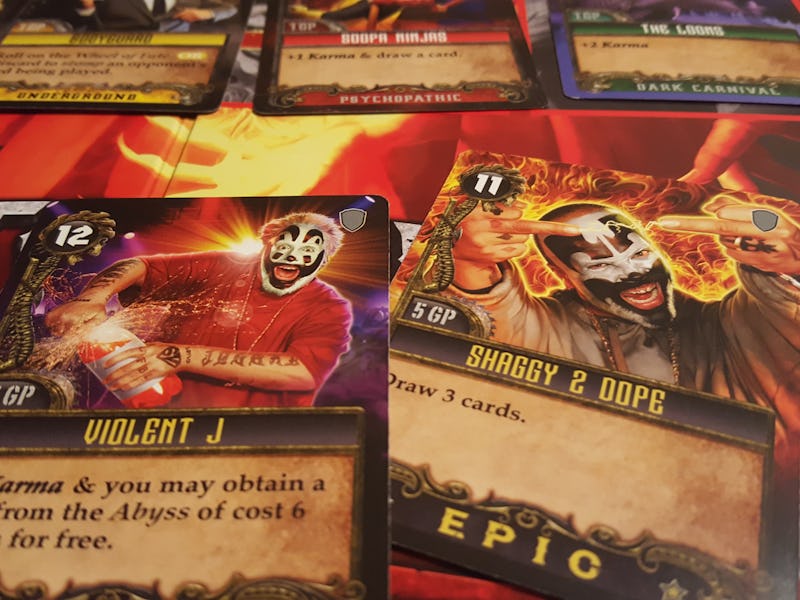The Best Thing About the Insane Clown Posse Card Game Is That It Exists
There's only one card game that features Vanilla Ice and an anthropomorphic ballsack.

There’s no pressing need for a deck-building game featuring Detroit hip-hop duo Insane Clown Posse to exist. So, naturally, it does — and that is the very best thing we can say about it. It is a game in which ties are decided by who shouts “Gimme my money, muddafocko!” faster. It is a game that features a flying pair of testicles with an uncanny resemblance to Christopher Reeve. It is a game in which the player with the most Gathering Points at the end of the game wins. It is a game in which a Vanilla Ice card is worth two of those points.
What I’m trying to say is “Into the Echoside” deserves a second look, but not in a good way.
Still, whoever lives in the Venn diagram intersection of Juggalos and game-players should not feel completely deflated. “Into the Echoside” checks off all of the boxes that make a deck-building game function: cards, a way to get more cards, and a way to end the game.
And if that sounds like a backhanded compliment, it isn’t. In the realm of branded games, functionality is not a given. “Echoside” can even be amusing, particularly if you’ve had three strong beers and it’s 2:00 a.m. in a post-industrial exurb.
To its credit, “Into the Echoside” makes no pretenses of being anything but an Insane Clown Posse deck-building game. You begin with a small crop of cards with names like Ninja and Hound Dog. (A Hound Dog is a male ICP super-fan, apparently.) If the game teaches you anything, it is that Juggalo culture is a linguist’s dream. Cards earn “karma,” which you spend to buy cards. Denying an opponent from using a card is “stomping” it. “Juggalo Juice” is the Michigan-based soft drink Faygo, which makes a cameo in the game as an item card.
The gameplay of “Into the Echoside” shares its soul with a treadmill, or maybe a pyramid scheme. You play cards from your hand to increase your karma, which you then spend so you can buy better cards. When you play those improved cards, you will have even more karma, which will let you buy cards one notch better than the cards you just played. Your karma-generating powers grow. At the top of the pyramid we find Epic cards, which give you access to unprecedented amounts of karma. After players buy up all the Epic cards, the game is essentially over.
There are a few interesting wrinkles along the way. Playing three cards of the same faction type — Psychopathic, Dark Carnival, or Underground — and you get a bonus. (One of them is more karma!) Items you buy sit in front of you and let you perform a special action each turn. Or you can plunk down a Fiend card, which lets you perform a special action once. The Testicles lets you add a cheap card to your deck for free.
Sometimes, you can roll the Wheel of Fate (a twelve-sided die), which can give you a random boon, the best of which is lots of karma. Sometimes, you get to draw a Flavor card, which will give you a random boon. Sometimes, you figure out a combo that thins your deck but for the very best karma cards, so that your stack of cards slide themselves into your hand as though dealt by a rabid Vegas shuffling machine. Sometimes, the compound word “Superballs” will appear on the table, which is sort of funny after three strong beers at one in the morning.
And then you realize, after you’ve played Superballs for the second time and the scrotummy chuckle sticks in your throat, you’d rather be playing the deck-building game “Star Realms.” It has a similar chain: More money leads to better card combos leads to victory. But the faction-based bonuses have a tighter design, and denying an opponent a “Star Realms” card by buying it yourself feels like actually doing something. Victory is won through combat, too; it’s an extra dimension that, in comparison, leaves “Echoside” looking a bit gaunt.
“Into the Echoside” does gets one thing perfectly right, and that is its art, from cheerfully face-painted Homies to various sinister clown entities to the rubber demons of the band GWAR, who, frankly, deserve to be in every card game.